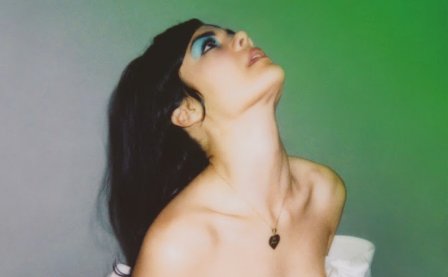Marriage has long been a fraught institution, but The Bride, the fourth full-length from Natasha Khan’s project Bat For Lashes, manages to extract beauty from it. Inspired in part by a short film directed by Khan called I Do (2015), the album tells a story, already turned into the beginnings of a novella, in which a bride’s fiancé is killed in a car crash prior to their wedding day. This macabre turn doesn’t doom the tale to tragedy, however; after a spooky romp with a ghost, a solo honeymoon, and nostalgic reminiscing, the story ends with the bride lost among clouds, praising rain as divine.
The cover of Bat For Lashes’s 2012 album The Haunted Man pictures Khan carrying a naked man slung across her shoulders. Her art is filled with such modified gender roles, which transcend mere inversion, by which women assert a strength that is also nurturing. On The Bride, Khan inhabits the journey of a mourning bride, but she resists idealizations of romantic love in her narrative and is instead drawn to the power of ritual itself, to the ways it punctuates our days. The delight in tradition for its own sake, with as few strings attached as possible, led Khan to tour through various chapels and cathedrals throughout the US and UK, inspired by what she calls the vulnerability of “witnessing something as a collective.”
Khan is intrigued by conventional wedding items, like the bouquet, but in general she resists the materialistic trappings of matrimony in favor of the simple intimacy of good company: “I don’t wanna waste my time/ Putting on dresses and drinking wine,” she sings on “In Your Bed.” When she tells her dead lover she just wants to spend time in the “world of our minds,” critics’ frequent comparisons of Kahn to Kate Bush begin to make sense (“I was hiding in a room in my mind,” sings Bush on “Them Heavy People”).
Musically, the arrangements are spare, bordering on simplistic, which allows the bride’s story to come to the fore. Less a concept album than “a storytelling album,” by Khan’s own definition, the drama is best digested as a whole. That said, individual tracks do stand alone, such as the crisp dance cut “Sunday Love” and the moving “If I Knew,” its melody inflected by delicate blue notes.
Although The Bride’s 13 musical numbers explore trust, loss, hope, and other well-worn aspects of romantic love, a resonant theme is embracing other forms of love: particularly affection for community and independence from anyone at all. As Khan said, “I also really liked the idea of going on a honeymoon, but going on your own, and how then you would only have yourself to fall in love with.” On “Honeymooning Alone,” she sings: “Driving my car in the night/ […] empty seat by my side.”
From Beyoncé’s preoccupation with her ringless finger to Khan’s own solitary adventure, our narratives of self-love are often dependent on the symbols of matrimony, if only as objects of refinement or critique. It might someday become commonplace to sing about love with no mention of weddings at all. For now, Bat For Lashes has contributed an imaginative installment to our love affair with marriage, in all its charms and discontents.
More about: Bat for Lashes




